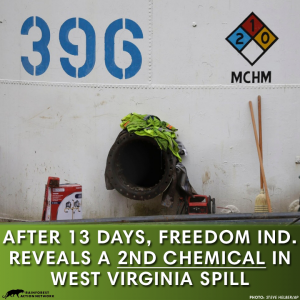 As I wrote last week, my two nieces live in Charleston, WV. Although their water has now been cleared as “safe,” they continue to have no clean water to drink. So, as you can imagine, I’m pissed.
As I wrote last week, my two nieces live in Charleston, WV. Although their water has now been cleared as “safe,” they continue to have no clean water to drink. So, as you can imagine, I’m pissed.
But there are a few reasons why I’m pissed.
And it didn’t start with the unbelievable quote from West Virginia’s Governor Earl Ray Tomblin, who said, “I’m not going to say absolutely, 100 percent that everything is safe. But what I can say is if you do not feel comfortable, don’t use it.”
It was frustrating to see most major media outlets perpetuate the illusion that, once water was deemed safe by officials, things could return to normal—contradicting actual residents who continued to find the chemicals in their tap water despite repeatedly flushing their pipes. (Send a letter to your local newspaper and demand they tell the full story!)
It was frustrating to realize that a lack of regulations helped create this disaster, which was completely preventable.
However, I’m most pissed that this is just one obvious example of the true price we pay for our dependence on coal.
Unfortunately, coal-related water contamination in Appalachia is not a new story or a unique occurrence. In the rural hollers of West Virginia, dozens of communities have already had their water poisoned, because toxic waste from mountaintop removal coal mining has seeped into aquifers, irreversibly ruining wells that people have used for generations.
A 2012 study found that 14 counties in West Virginia had water that did not meet safe drinking water standards. In counties where mining occurred, water was seven times worse than in counties without mining. In addition, contamination of watersheds in West Virginia is part of the reason why so many people depend on a single water source.
Runaway coal contamination is possible because of a lack of regulations to ensure safe drinking water and because, for a century, the coal industry’s profit margin has been put ahead of people—and our water. When we look more broadly at health impacts, a recent Harvard study estimated the annual health expenses associated with coal over its entire lifecycle cost the U.S. $500 billion a year and lead to more than 13,000 premature deaths.
 National headlines last week shone a rare public light on one of the most severe and under-reported American environmental crises of our times. The tragic water crisis still underway in West Virginia, caused by a massive coal chemical spill that poisoned water supplies for at least 300,000 people, is just another cry from the canary telling us that coal is not a solution for our energy needs. The emergency water shut-off last week spanned nine counties and shut down the state’s capital city for four days.
National headlines last week shone a rare public light on one of the most severe and under-reported American environmental crises of our times. The tragic water crisis still underway in West Virginia, caused by a massive coal chemical spill that poisoned water supplies for at least 300,000 people, is just another cry from the canary telling us that coal is not a solution for our energy needs. The emergency water shut-off last week spanned nine counties and shut down the state’s capital city for four days.
But most disturbing is that this recent tragedy was both predictable and preventable. Sadly, it offers a somber preview for what we can expect to see more of in the future if major changes are not finally made immediately.
Rainforest Action Network is no stranger to the many impacts of coal on the communities in West Virginia. We have been working to defend the people, forests and watersheds in Central Appalachia for years. But this last summer, the issue became deeply personal for me.
I travel to WV not only to visit family, but also to see firsthand the impacts of one of the most extreme coal extraction methods on the planet, where entire mountaintops are blown off to expose coal seams below. The resulting toxic waste is then dumped into neighboring valleys—irreversibly destroying the function of the local watershed.
While in Appalachia last summer, I felt the Earth shudder under my feet as mountains nearby were being blown up just a short distance from the home of our local host, Paul Corbit Brown of Pax, WV.
Paul is a seventh-generation West Virginian whose home is adjacent to an active mountaintop removal coal mining site. His family has been forced to deal with the deadly impacts of reckless coal extraction for decades. Paul made it clear to me that while the government of West Virginia has bent over backwards for the coal industry in his state, it has done little to nothing to protect the region’s people, who have suffered its devastating consequences.
While visiting, I literally saw streams flowing bright orange from upstream coal mining contamination, and witnessed the emergency health crises people face every day: high cancer rates, cases of life-threatening “black lung” disease and limited access to clean water.
Earlier this month, just after news of the spill broke, Paul explained that the chemical that leaked has been used to process coal for a long time in West Virginia. In fact, its effluent has been stored in more than 100 unlined pits and been injected into abandoned mines that now contaminate the area’s aquifers, forcing people to abandon wells that once provided safe drinking water. (Some former West Virginia coal miners have come forward to say the same thing.)
The people in Appalachia have been forced to endure the toxic impacts of the coal industry for far too long already. This incident cannot be seen as an isolated event.
Every time we flick on the switch from coal energy, we should be reminded about the true cost of coal, a burden that people at the point of extraction, like West Virginia, and at the point of burning, such as neighborhoods in the shadow of coal-fired power plants, feel disproportionately. The numbers are staggering. U.S. $500 billion a year in health care costs foisted on us by a coal industry unwilling to pay for the impacts of its business operations? Are more than 13,000 premature deaths the price we should have to pay for coal industry profits?
”It’s tragic that it takes an event like this to awaken us to reality,” said my friend Paul. “No industry should have the right to profit at the expense of another human being’s life. I remind you: There cannot be a healthy economy without clean water.”
As this crisis in West Virginia has brought the impacts of extreme coal extraction to our collective attention, let us now take the bold steps needed to move away from dangerous coal energy altogether, and move instead toward safer, cleaner energy choices.
The next time I talk to my nieces about the future, instead of just discussing basic regulation that will better prevent coal chemicals from leaking into major water supplies, I’d rather discuss the transition away from coal so that climate change, water contamination and health problems can be prevented.
Let’s not treat the symptom—let’s support the cure.
If you are as pissed as I am please consider joining the over 500 people who have taken action by sending a letter to their local newspaper requesting they cover the full story on coal impacts on our water and beyond.